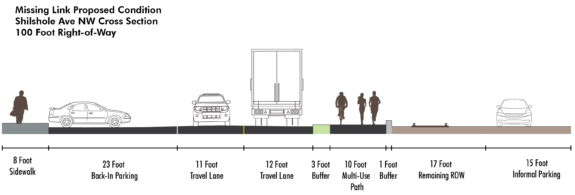
As expected, longtime opponents of the Ballard Missing Link of the Burke-Gilman Trail have filed a complaint in King County Superior Court (PDF) challenging SDOT’s claim that their redesigned trail project is exempt from the State Environmental Policy Act (“SEPA”), the primary legal tool opponents have used to delay the 1.4-mile trail for two decades. Because SDOT anticipated an appeal, they built some legal delay time into their anticipated project construction timeline. If all goes well, the department hopes to begin construction in 2022 or 2023 and complete the project using the funds earmarked for this specific trail project in the voter-approved Move Seattle levy.
The latest trail design significantly scales back the previously planned package of roadway changes, especially along NW 45th Street between Shilshole Ave NW and Fred Meyer. Because the Ballard Terminal Railroad pursued action to block the city’s plans to realign the tracks, SDOT’s new design would leave them where they are, build the trail along the south side of the street, and maintain one-way travel for general traffic rather than reopening two-way traffic as was planned. This dramatically reduced the cost and scale of the project. The new design also decreased the planned trail width to ten feet plus a buffer. Added together, the total area of new pavement falls beneath the threshold for environmental review, SDOT says.
The appeal will test SDOT’s environmental review argument. The complaint also argues that SDOT needs a Shoreline Substantial Development Permit from the Shoreline Hearings Board and a National Pollutant Discharge Elimination System (“NPDES”) Construction Stormwater General Permit from the State Department of Ecology. As has proven effective in previous appeals, the new complaint throws a lot of different arguments at the city in hopes that at least one of them sticks. We will see how this one goes.
“It is unfortunate that legal challenges from special interest groups have delayed this important safety project for so many years,” SDOT spokesperson Ethan Bergerson told the Seattle Times, “and we believe this new plan will resolve this issue in court so we can finally move forward and give the bike, walking and rolling community a safe route to enjoy the treasure that is the Burke-Gilman trail.”
There are no new substantive arguments in the appeal. It’s all about legal technicalities at this point. Does the project exceed such and such criteria for this or that permit, etc. The latest court defeat for the trail also had nothing to do with the trail itself or even with SDOT. Instead, appellants somehow completed a legal Hail Mary by arguing that the then-Deputy Seattle Hearing Examiner Ryan Vancil had “violated the appearance of fairness doctrine” in making his decision about SDOT’s environmental impact statement. So years of court battles were erased on a technicality that had nothing to do with the trail design itself. With the prospect that redoing court battles would stretch beyond the expiration of the Move Seattle Levy, SDOT decided to pursue their simplified project instead.
The public debate portion of this project is long behind us, with the public very clearly advocating on behalf of the city’s planned Shilshole route for the trail. About 89% of people who commented on the city’s exhaustive environmental study and specified a preferred option said they supported the trail on Shilshole. Now it is simply up to the courts. Again.
Meanwhile, Washington Bike Law (Disclosure: Washington Bike Law advertises on Seattle Bike Blog, though they did not pay for this mention) is building a case representing people who have been significantly injured (broken bones, ligament damage, head injuries, anything requiring surgery, etc) due to the unsafe biking conditions along the Missing Link. They are encouraging people to get in touch if they have been injured while biking in the Missing Link area. Unfortunately, this applies to a lot people.








Comments
4 responses to “Ballard Missing Link opponents file appeal against city’s scaled-back trail plan”
When the Obstructionists first sued, SDOT should have put permanent no-parking signs along the route of the Missing Link.
If the Obstructionists are going to use their money to prevent the public from using public ROW, they should not be able to use it for free parking either.
I work on Shilshole, and this was the least bad plan so far.
It is clear how broken our legal system is, that anyone with deep enough pockets can delay projects they don’t like, indefinitely, through the courts. And also, how bike trails are subject to a higher degree of legal scrutiny than highway projects. Can you imagine what would have happened if somebody tried to file missing-link-style lawsuits to stop a widening of I-5? Or I-405? They’d be laughed out of the courtroom.
The Ballard appalants have also put the city in a position where they cannot give up and simply relocate the trail without setting a terrible precedent which will invite similar lawsuits on every other trail the city may ever want to build in the future. So, no matter how much money gets wasted on lawyers, the city, at this point, has no choice but to follow through.
Agreed. Another factor is that major freeway project budgets allow for huge and overwhelming legal teams to force things through. Honestly, the city should have won in court a long time ago, but the legal team did not cross every t, and appellants found them. This might have been an error on the legal team’s part, or it could just be a factor of not having enough resources to make their case airtight. But the larger point stands: This level of environmental review is an unreasonable requirement for a bike trail.